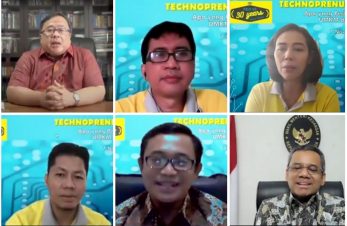Seminar of FEB UI Alumni Batch 90 “Technopreneurship: What MSMEs Need to Adopt from Start-Up Greatness?”
DEPOK – (7/11/2020)
“The government really supports the growth of MSMEs and start-ups in Indonesia,” said Minister of Research and Technology / Head of the Indonesian National Research and Innovation Agency, Prof. Bambang Brodjonegoro, Ph.D., in his remarks at the 30 Year Reunion, Alumni of the Faculty of Economics and Business, University of Indonesia, Batch 90, which held a webinar entitled “Technopreneurship: What MSMEs Need to Adopt from Start-Up Greatness?” on Saturday (7/11/2020).

Bambang continued, “The government also has a ‘Start-Up Indonesian Innovation’ program, which provides 1,707 funding packages to prospective start-ups engaged in 8 priority sectors, namely food, transportation, engineering engineering, maritime affairs, health, energy, defense and security. , multidisciplinary and cross-sectoral. For MSMEs affected by the Covid-19 pandemic, the government has created a “Innovating MSMEs” program and a “Rising Indonesian MSMEs” program that synergizes with public and private universities. A total of 27 universities in 11 provinces have received funding to help MSMEs.”

Omar S. Siregar, Chair of the 30th FEB UI’90 Reunion Committee, said that this webinar was a way of giving back by FEB UI’90 alumni, to the UMKM community so that they continue to be enthusiastic in fostering the spirit of technopreneurship in society, in building the Indonesian economy. Part of the income from this webinar will also be donated to the Econity Foundation, which is a social foundation founded by alumni of FEB UI’90.
The webinar presented speakers, namely Dr. Rambat Lupiyoadi, M.E., Lecturer at FEB UI and author of the Book of Technopreneurship for MSME Activists, and Roberto Surya Negara, Director of Telkom Sigma, with moderator PJ. Rahmat Susanta, Marketing Consultant and Managing Partner, Brighter PR and Marketing.
Deputy Minister of Finance of the Republic of Indonesia, Prof. Suahasil Nazara, Ph.D., in the keynote speech said that the seriousness of the government in helping MSMEs and start-ups can be seen from the assistance for MSMEs amounting to Rp. 114.82 trillion. This fund is intended to provide interest subsidies, expenditure for guarantee services, Final PPh for MSMEs, investment financing for cooperatives through the MSME revolving fund Management Institution, as well as productive assistance for around 12 million micro businesses.

Suahasil continued, “The government also provides productivity improvement programs for MSMEs in several forms, namely social assistance for the Family Hope Program, Village Fund for Empowerment of MSMEs, Joint Business Groups, Ultra Micro Financing (UMi), revolving funds, interest subsidies, productivity improvement programs and industrial innovation. Meanwhile, in terms of taxation, the government has provided a tax stimulus by reducing rates and treating PPh, especially for MSMEs, from 1% to 0.5% previously. The government’s role in growing the MSME ecosystem and start-ups is indeed important. But on the other hand, the perpetrators must also have the attitude and spirit of technopreneurship.”
Rambat Lupiyoadi, explained that there are at least five start-up business practices that can be imitated. First, how they form a team and build a business team mentality, for example by recruiting those who are entrepreneurial, by giving a percentage of the results so that they feel as part of the founder of the business. Second, MSMEs can adopt how they create products that suit market needs, such as implementing the lean product life cycle stages, by strengthening product validation tests before mass production.

Third, MSMEs protect profits through HAKI, to anticipate the use of brands and their uniqueness from irresponsible parties. Fourth, MSMEs can market products by relying on the viral engine of growth, which is cheap but able to increase turnover. Fifth, MSMEs can adopt inexpensive but effective fundraising methods. MSMEs need to find smart money and not wait for grants, assistance or loans. Crowdfunding, for example, can be an alternative funding for SMEs in congregation.
To be able to adopt this start-up practice, Roberto Surya Negara, as the second speaker, emphasized the need to change the mindset of MSME players. The mindset in question is the agile mindset, MSME players must be willing to change easily and quickly. Failure in the start-up world is common, but most importantly it can change and move again quickly. Not only in the mindset, this agile nature must be internalized in culture and daily practices. UMKM actors must be able to explore the new way of doing, with continuous learning. Innovation must be the blood of MSMEs.

“These start-ups actually already have the tools so that their agile and innovative characteristics can be adopted by MSMEs, such as generating, developing, scale-up and running a business. In Indonesia, there are many communities and ecosystems to help and build start-ups itself and initiated by large companies in Indonesia. Telkom Sigma, for example, has many services that can help accelerate the MSME business. Starting from the data center, cloud, ERP to the incubation program,” said Roberto closing the session.
This seminar was sponsored by BNI Sekuritas and Telkom Sigma assisted by Anheim Consulting and Training (ACT), hosted by Rasmi M Ramyakim, Head of Corporate Secretary, Project Management, Risk Management of PT KSEI. (hjtp
(am)






